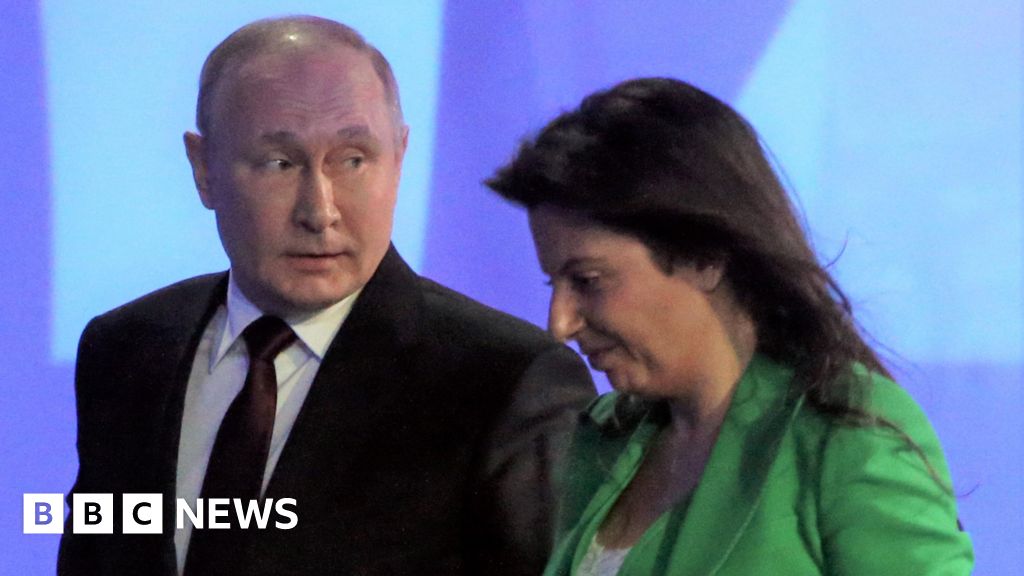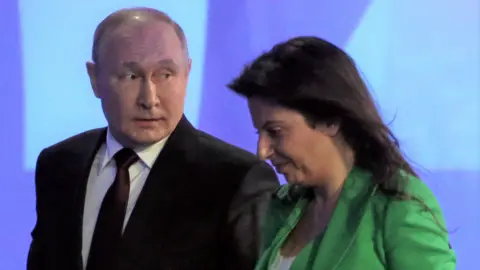Bussiness
US accuses Russia of interfering with presidential election

 Getty Images
Getty ImagesThe US has charged and sanctioned Russian state media executives and restricted Kremlin-linked broadcasters as it accused Moscow of a widespread campaign to interfere with the presidential election.
The justice, state and treasury departments announced coordinated actions on Wednesday to “aggressively counter” the alleged operations.
Attorney General Merrick Garland accused state broadcaster RT, formerly Russia Today, of paying a Tennessee firm $10m to “create and distribute content to US audiences with hidden Russian government messaging”.
RT boss Margarita Simonyan was one of 10 people sanctioned for alleged attempts to harm “public trust in our institutions”. RT denied involvement.
Mr Garland said that Moscow wanted to secure a “preferred outcome” in the race between Donald Trump and Kamala Harris.
White House national security spokesman John Kirby said that Russia’s programme was aimed at “reducing international support for Ukraine, bolstering pro-Russian policies and interests, and influencing voters here in the US”.
A Treasury official meanwhile said that RT and other Russian state media had engaged in a “nefarious campaign to covertly recruit unwittingly American influencers in support of their malign activity”.
The Biden administration’s response so far includes:
- Charging two Moscow-based managers of RT – Kostiantyn Kalashnikov, 31, and Elena Afanasyeva, 27 – for paying content creators on US soil to “pump pro-Russia propaganda and disinformation” to US audiences;
- Sanctioning two entities and 10 people including Simonyan, RT editor-in-chief, for “activities that aim to deteriorate public trust in our institutions”;
- Restricting visas for employees of Kremlin-backed media outlets;
- Seizing 32 internet domain names used to “covertly promote AI-generated false narratives” targeting specific US demographics and regions on social media;
- Designating Rossiya Segodnya and five of its subsidiaries (RIA Novosti, RT, TV-Novosti, Ruptly, and Sputnik) as “foreign missions”, requiring them to report information about their personnel to the US government;
- Offering a $10m reward for information on hackers associated with the Russian group, Russian Angry Hackers Did It (RaHDit).
Much of the Kremlin’s disinformation effort is directed and funded by RT, Mr Kirby said.
“RT is no longer just a propaganda arm of the Kremlin,” he said. “It’s being used to advance covert Russian influence actions.”
The state media outlet mocked the US government’s accusations, saying in a statement to the BBC that “2016 called and it wants its clichés back”.
“Three things are certain in life: death, taxes and RT’s interference in the US elections.”
The criminal indictments of Kalashnikov and Afanasyeva do not identify by name the Tennessee-based content creation company they used.
But the court filing’s description of “a network of heterodox commentators that focus on Western political and cultural issues” matches the self-description carried on the website of an outlet named Tenet Media.
Tenet posts thousands of English-language videos on social media, and promotes well-known right-wing commentators Benny Johnson, Tim Pool and Dave Rubin as its “talent”.
Pool said on Twitter/X that he and other commentators had been “deceived” and were themselves “victims”.
The company has been contacted for comment.
US officials warn that a growing number of foreign adversaries have attempted to interfere with its elections since Russia’s efforts in 2016.
In June, a group of hackers linked to the Iranian government successfully breached Donald Trump’s campaign and leaked internal documents.
A month later, the Department of Justice announced the seizure of two domain names and the search of nearly 1,000 social media accounts operated by Russian actors to “create an AI-enhanced social media bot farm that spread disinformation”.
Researchers have also uncovered a growing Chinese influence operation aimed at infiltrating and swaying US political conversations on social media.
Xi Jinping, China’s president, pledged his country would not interfere in the US election during a summit with President Joe Biden last November.
Jen Easterly, director of the US Cybersecurity and Infrastructure Security Agency, said on Tuesday that the US could “absolutely expect… foreign adversaries” to try to “undermine American confidence in our democracy… and sow partisan discord”.
“And that’s why it is up to all of us not to let our foreign adversaries be successful.”
Eight years ago, Russia conducted a sophisticated campaign that involved hacking the Democratic National Committee and leaking stolen documents to Wikileaks with the intent of hurting Hillary Clinton’s presidential campaign.
Many Democrats argue the operation helped contribute to Trump’s eventual victory that November.
US politicians and intelligence officials have since concluded that the operation was directly ordered by Vladimir Putin, Russia’s president.
Twelve Russian military intelligence officers were charged in 2018 with orchestrating the effort, and federal warrants were issued for their arrest.










